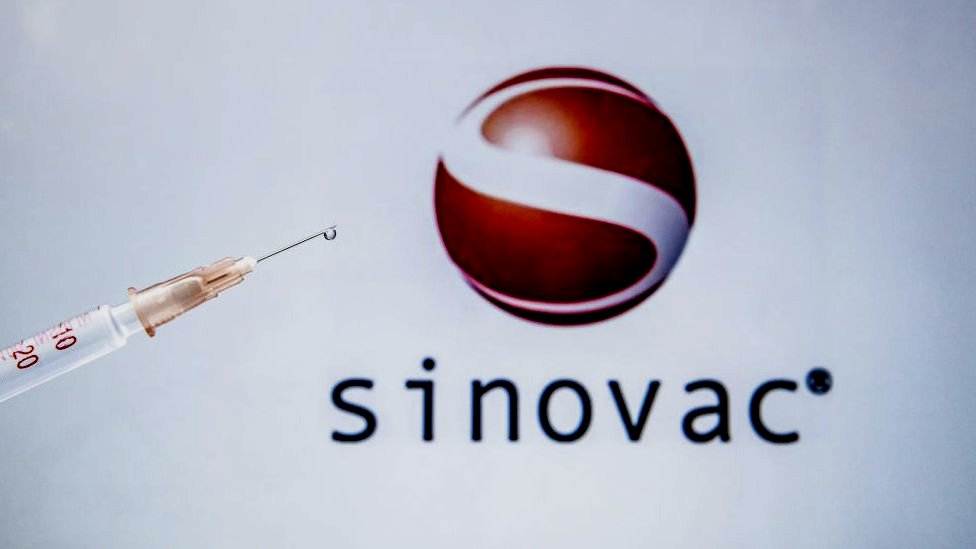
It shows the vaccine is significantly less effective than previous data suggested - barely over the 50% needed for regulatory approval.
The Chinese vaccine is one of two that the Brazilian government has lined up.
Brazil has been one of the countries worst affected by Covid-19.
Sinovac, a Beijing-based biopharmaceutical company, is behind CoronaVac, an inactivated vaccine. It works by using killed viral particles to expose the body's immune system to the virus without risking a serious disease response.
Several countries, including Indonesia, Turkey and Singapore, have placed orders for the vaccine.
Last week researchers at the Butantan Institute, which has been conducting the trials in Brazil, announced that the vaccine had a 78% efficacy against "mild-to-severe" Covid-19 cases.
But on Tuesday they revealed that calculations for this figure did not include data from a group of "very mild infections" among those who received the vaccine that did not require clinical assistance.
With the inclusion of this data, the efficacy rate is now 50.4%, said researchers.
But Butantan stressed that the vaccine is 78% effective in preventing mild cases that needed treatment and 100% effective in staving off moderate to serious cases.
The Sinovac trials have yielded different results across different countries.
Last month Turkish researchers said the Sinovac vaccine was 91.25% effective, while Indonesia, which rolled out its mass vaccination programme on Wednesday, said it was 65.3% effective. Both were interim results from late-stage trials.

Can vaccines be compared?
By Philippa Roxby, BBC Health reporter
The latest figures for China's coronavirus vaccine show just how difficult it is to compare vaccines.
On the face of it, the 50% effectiveness figure isn't as good as Oxford's 70% or Pfizer and Moderna's 95%. But trials are run very differently in different countries - the numbers of volunteers enrolled varies wildly, as do the criteria used to test how much protection the vaccines offer.
A figure for efficacy is reached by looking at how many people developed Covid after being given the vaccine, compared with how many were affected when given a dummy injection. Normally, that is based on people developing obvious symptoms but in this Brazilian trial, people with no symptoms also appear to have been included.
So it's only when the full data from all trials of this vaccine are published that scientists can analyse its real efficacy, and compare like with like. Only limited data for this Sinovac vaccine is currently available - and experts say that is confusing the picture.
In the long term, many vaccines against Covid are needed to vaccinate the world and, inevitably, some will perform better than others - but giving as many people as possible some protection is the priority.

There has been concern and criticism that Chinese vaccine trials are not subject to the same scrutiny and levels of transparency as its Western counterparts.
Both the Sinovac vaccine and the vaccine developed by Oxford University and pharmaceutical firm AstraZeneca have requests for emergency use authorisation pending with regulators in Brazil.
The latest news comes as Brazil is dealing with a major spike in cases. The country currently has the third highest number of Covid-19 cases in the world at over 8.1 million, just behind the US and India.
The BBC World Service's Americas editor Candace Piette says the country is suffering one of the world's deadliest outbreaks but as yet, has not announced when its vaccination programme will begin.
The delay has been caused in large part by the government's haphazard and divided approach to vaccination, says our correspondent.
"world" - Google News
January 13, 2021 at 05:38PM
https://ift.tt/3nFkFZ8
Sinovac: Brazil results show Chinese vaccine 50.4% effective - BBC News
"world" - Google News
https://ift.tt/3d80zBJ
https://ift.tt/2WkdbyX
Bagikan Berita Ini














0 Response to "Sinovac: Brazil results show Chinese vaccine 50.4% effective - BBC News"
Post a Comment